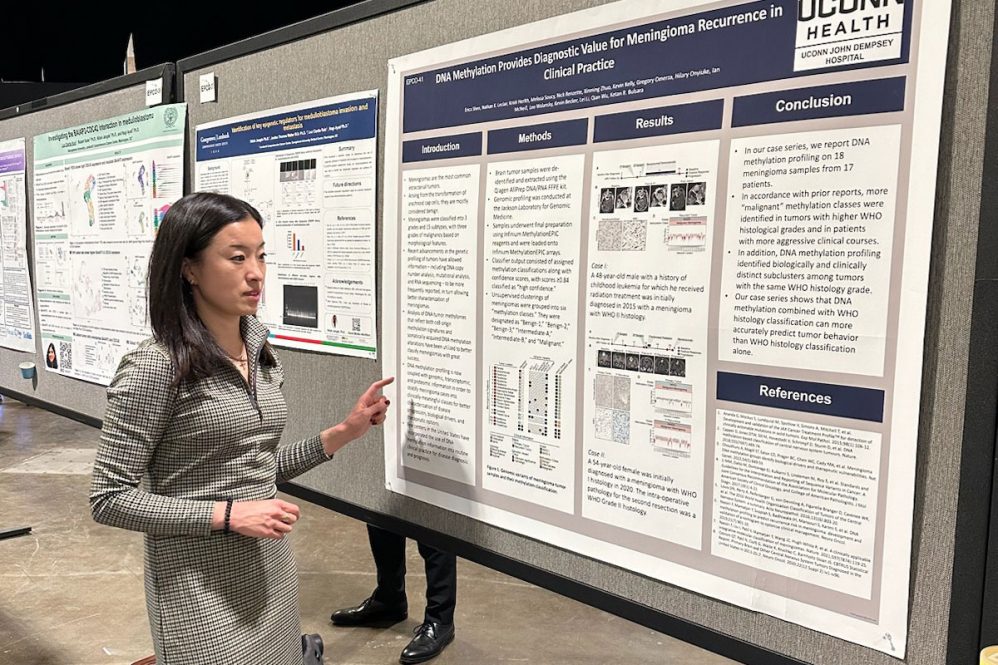If you had a brain tumor, knowledge of its molecular detail would give your doctors an unparalleled level of insight into how best to treat it.
There are few places in the world that have access to that magnitude of a tumor’s detail by way of an advanced diagnostic method known as a whole genome methylation array analysis.
This methylome profiling allows us to precisely give a grading of the meningioma.
— Dr. Qian Wu
One of those places is Farmington, Connecticut, where UConn Health and The Jackson Laboratory for Genomic Medicine (JAX) have been collaborating on brain tumor genomic sequencing for the last five years. Most recently, they’re employing this methylome profiling technique and using the data it yields to inform treatment decisions.
“We are one of the few centers in the country that can routinely do a 550-gene panel analysis of tumors in almost real-time to guide treatment,” says. Dr. Ketan Bulsara, chief of the UConn Health Division of Neurosurgery. “Furthermore, though many centers use the methylation signature of tumors for research purposes, to the best of my knowledge we are one of nine centers in the world and one of four in the United States that is routinely using it for clinical analysis of these tumors to guide treatment.”
The clinical implementation into treatment paradigms is led by Dr. Kevin Becker, Director of Medical Neuro-Oncology.
Dr. Qian Wu, chief of UConn Health’s anatomic pathology and autopsy service, and Dr. Lei Li, JAX clinical laboratory director, are co-collaborators on this initiative. Dr. Erica Shen, a third-year UConn neurosurgery resident, recently presented this at the Society for Neuro-Oncology’s annual meeting Nov. 16-20 in Tampa.

This summer they published findings on their application of targeted genomics to meningiomas, the most common primary central nervous system tumors, in Acta Neurochirurgica, the European Journal of Neurosurgery.
“This methylome profiling allows us to precisely give a grading of the meningioma,” Wu says. “Traditionally, the grading is quite subjective. There are three grades of many, so there’s considerable variability. Those patients who are grade one don’t get any further treatment, but grade twos get radiation. So precise diagnosis is very important for the treatment and the prognosis because the grade ones are considered benign, and grade two and above are considered aggressive.”
She says the brain tumor diagnostic field has been progressing in recent years by incorporating molecular signatures, enabling diagnosis of different classes of brain tumors.
“With the traditional methods, we did not know their molecular signatures,” Wu says. “We could roughly classify them but not diagnose them with molecular tools.”

Using the example of one of the most common malignant tumors, known as a glioblastoma, a tissue sampling may suggest a low grade, but molecular tools can detect characteristics that would make it a high-grade tumor, resulting in a much different — potentially life-saving —treatment and prognosis.
“Because of the close collaboration between pathology, neurosurgery, and neuro-oncology, we also receive a lot of feedback from the clinic about how useful genomic tools are to clinicians to help them refine their diagnosis and help guide the patient’s treatment,” Li says.
The JAX-UConn Health collaboration performs genomic sequencing of all brain tumors, and the institutions’ multidisciplinary brain tumor board discusses the results at its biweekly meeting.
“Dr. Li’s expertise in running the molecular analysis enables us to get our patients’ samples evaluated,” Wu says. “What’s more is that the quality of the UConn brain tumor board is really greatly enhanced by this state-of-the-art molecular component.”
An added benefit is JAX’s rich database for clinical trials potentially available for patients based on their mutations.
“All these data together really enhance UConn’s capabilities of providing precise diagnosis as well as better treatment choices for the patients,” Wu says. “We really can anticipate that all this together will draw patients to UConn for the best treatments available.”
Learn more about methylome profiling at The Jackson Laboratory for Genomic Medicine.
Learn more about brain cancer care in the Carole and Ray Neag Comprehensive Cancer Center.



